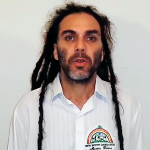Come learn Capoeira Angola at CEDANZE · Academia João Pequeno de Pastinha · Mestre Faísca

MESTRE FAÍSCA
The CEDANZE International Institution is daily advertised as AJPP·CECA
ACADEMIA JOÃO PEQUENO DE PASTINHA - CENTRO ESPORTIVO DE CAPOEIRA ANGOLA
LINNING | CEDANZE ASSOCIATION
“I came from a humble family in rural São Paulo, raised by my mother, who also looked after my seven siblings. Surrounded by so much struggle, it was through culture, in the form of Capoeira Angola, that I cultivated my character and my sensitivity for the extremely serious social problems that plague our country”
Mestre Faísca
BIOGRAPHICAL SUMMARY OF MESTRE FAÍSCA
Childhood
Born in São José do Rio Pardo, in the inland of the state of São Paulo, Luís Roberto Ricardo, today known as Mestre Faísca, son of Maria Aparecida da Silva Ricardo and José Ricardo Filho was raised by his mother in the absence of his father, together with seven siblings. So that she could support her children, the heroic Maria did the laundry and cooked in families’ homes. At times, she accumulated different jobs, for example during the day in a hotel kitchen and at night in a restaurant, and hardly managed to spend time at home.
Mestre Faísca, who from a tender age was interested in fighting sports, used to go to an open field in the neighbourhood of João de Souza to train with his peers. His mother, tired of hardship, disapproved of this because she felt that her son should rather go to school and have his professional degree, as she saw fighting as a thing of aimless people.
First steps in Capoeira
From an afro-descendent perspective, you are born a “capoeira” (or “capoeirista”). In the case of Mestre Faísca, it was as a teenager that he first began practicing the movements of this art form. This happened in São José do Rio Pardo with a capoeirista named Luiz Carlos Viana, who later abandoned capoeira. Mestre Faísca persevered and started teaching capoeira in the town of Mococa-SP where he founded his first group. He later sought the support of Mestre Izael Teixeira in São Carlos – SP who accepted him. Mestre Faísca then began the unrelenting mission of recuperating Capoeira Angola. In that region, capoeira was at the time just called “capoeira”.
In 1991, at the University of São Paulo (USP), Mestre Faísca had his first lesson with Mestre João Pequeno de Pastinha, who later came to be his mestre. Mestre Izael opts to recover the Capoeira Regional of Mestre Bimba. Mestre Faísca, feeling that he had finally found the essence of the Capoeira Angola that he was seeking for so long, proceeded with his own group of Capoeira Angola. During his pursuit, he later joined his group to the Grupo Semente do Jogo de Angola but soon realized that it didn’t meet his expectations and dissociated himself to proceed on his own.
In Salvador
In 1996, Mestre Faísca moved to Salvador where he could be close to the mestre who fulfilled him, Mestre João Pequeno de Pastinha. He soon integrated the Academia de João Pequeno de Pastinha – Centro Esportivo de Capoeira Angola located in the fort Santo Antônio Além do Carmo.
Mestre Faísca and the other students at the fort felt privileged to be directly trained by Mestre João Pequeno de Pastinha, who had resumed giving practical lessons every Monday at the fort. As time went by, Mestre João Pequeno’s endeavours in the states of São Paulo and Bahia were being increasingly recognized and valued by the national and international capoeira community.
Graduation
During a meeting in 2001, Mestre João Pequeno de Pastinha stated the following:
"I am going to graduate Faísca to mestre, as his work is looking good and he deserves it".
On October 14 of the same year, in an event at the Academia do Forte Santo Antônio Além do Carmo, Salvador-Ba, Luís Roberto Ricardo received from Mestre João Pequeno the title of “mestre”, which formally introduced him as Mestre Faísca to the capoeira community. This decision by Mestre João Pequeno de Pastinha confirmed Mestre Faísca in his conviction that the path he was pursuing was the right one for him, and also provided him with solid orientation of how to act in relation to others and to capoeira itself. It was with Mestre João Pequeno that Mestre Faísca understood for the first time the real sense of the master-disciple relationship. Since then, Capoeira Angola assumes vital importance for Mestre Faísca, and any other path from the one he has trodden so far would be for him unconceivable.
Mestre Faísca currently
Currently , Mestre Faísca is in the coordination and supervision of CEDANZE Internacional · João Pequeno de Pastinha Academy · Capoeira Angola Sports Center with official headquarters in Rio Vermelho | Vale das Pedrinhas · Salvador · Bahia, and in centers located in other cities in Brazil and Europe.
Mestre Faísca’s work has the goal of preserving Afro-Brazilian culture through Capoeira Angola, as experienced through the lens of Mestre João Pequeno’s technique, which is used as an element to further positive socio-educational change.
